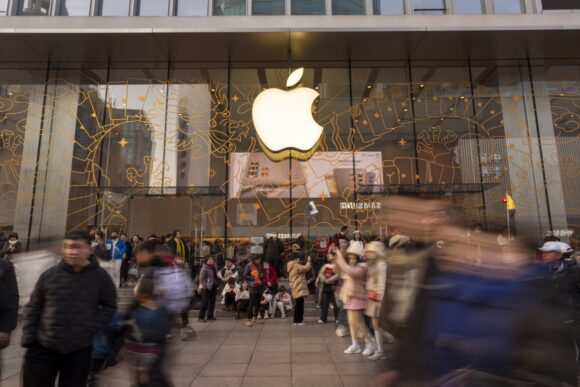The US Justice Department and 16 attorneys general sued Apple Inc., accusing the iPhone maker of violating antitrust laws by blocking rivals from accessing hardware and software features on its popular devices.
The suit, filed Thursday in New Jersey federal court, marks the culmination of a five-year probe into the world’s second-most-valuable technology company. The Biden administration has made competition a cornerstone of its economic policy, with Silicon Valley becoming a key focus.
Shares of Apple extended declines on the news, down 3.3% to $172.79 at 10:56 a.m. in New York.
The lawsuit alleges that Apple has used its power over app distribution on the iPhone to thwart innovations that would have made it easier for consumers to switch phones. The company has refused to support cross-platform messaging apps, limited third-party digital wallets and non-Apple smartwatches and blocked mobile cloud streaming services.
“This case is about freeing smartphone markets from Apple’s anticompetitive and exclusionary conduct and restoring competition to lower smartphone prices for consumers, reducing fees for developers, and preserving innovation for the future,” according to the suit, which seeks changes in Apple’s practices rather than a breakup.
‘Dangerous Precedent’
The company said the lawsuit was “wrong on the facts and the law,” warned that it would “set a dangerous precedent, empowering government to take a heavy hand in designing people’s technology” and vowed to “vigorously defend against it.”
“At Apple, we innovate every day to make technology people love — designing products that work seamlessly together, protect people’s privacy and security, and create a magical experience for our users,” the company said in a statement. “This lawsuit threatens who we are and the principles that set Apple products apart in fiercely competitive markets.”
The complaint highlights five examples of technologies in which it says Apple suppresses competition: super apps, cloud streaming game apps, messaging apps, smartwatches and digital wallets.
Apple recently added support for cloud-based gaming services and said it would add RCS cross-platform messaging later this year.
The group of attorneys general includes those of California, New Jersey and Washington, DC.
Started in 2019
The Trump administration’s Justice Department opened its antitrust probe of Apple in 2019. A 2020 House investigation into four tech giants found that Apple operates as a monopoly in software distribution on the iPhone, generating massive profits from commissions of as much as 30% that it charges developers.
In 2020, Epic Games Inc., the maker of the popular online video game Fortnite, sued Apple over its App Store. A federal judge found the App Store policies didn’t violate federal antitrust law but did breach California state law.
As a result of that case, Apple said in January that it would allow US developers to use alternative payment systems, but charge a lower fee of 27% for most digital purchases or 12% on subscriptions. Epic is contesting those changes, saying they are inadequate.
On Wednesday, Microsoft Corp., Meta Platforms Inc. and X Corp., the company formerly known as Twitter, also took aim at Apple’s proposed changes, saying the iPhone maker has imposed onerous limitations on links to alternate payment systems.
Latest Antitrust Challenge
The US lawsuit is the latest in a string of antitrust cases challenging the tech giant. Earlier this month, the European Union fined Apple €1.8 billion ($2 billion) for shutting out rival music services on the iPhone. Apple is appealing.
Meanwhile, the company made several changes to its App Store policies in Europe to comply with the EU’s new gatekeeper rules for Big Tech — the Digital Markets Act. Cupertino, California-based Apple will allow European users to download iPhone apps from the web, let developers offer discounts outside the App Store and permit third-party marketplaces to sell apps.
Apple also restructured the fee it charges European developers, setting a cheaper rate of 17%, along with a 3% processing charge for software that uses its in-app purchasing system and a 50-cent fee per app install for software that’s downloaded more than 1 million times in a 12-month period.Those fees have already raisedobjections from some developers and EU regulators are likely to probe whether Apple’s proposed changes comply with the law.
Last week, the company reversed course and said it would restore Epic’s developer account, allowing the Fortnite maker to build its own EU app store, which could compete with Apple’s own. That came a day after Brussels regulators questioned Apple’s decision to bar Epic and raised the prospect of further fines for the iPhone maker.
The latest case marks the third time the Justice Department has sued Apple for antitrust violations in the past 14 years. In 2010, the company agreed to settle allegations that it illegally agreed not to poach employees from Google, Adobe Inc. or Walt Disney Co.’s Pixar.
Two years later, the Justice Department sued Apple and book publishers for illegally fixing the price of e-books sold on the iPad. After the Justice Department won at trial, Apple was forced to accept a monitor and adopt policies and training to improve its compliance with antitrust law.
Photo: Photographer: Raul Ariano/Bloomberg
Topics Lawsuits California
Was this article valuable?
Here are more articles you may enjoy.



 Q4 Global Commercial Insurance Rates Drop 4%, in 6th Quarterly Decline: Marsh
Q4 Global Commercial Insurance Rates Drop 4%, in 6th Quarterly Decline: Marsh  Florida Engineers: Winds Under 110 mph Simply Do Not Damage Concrete Tiles
Florida Engineers: Winds Under 110 mph Simply Do Not Damage Concrete Tiles  Trump Demands $1 Billion From Harvard as Prolonged Standoff Appears to Deepen
Trump Demands $1 Billion From Harvard as Prolonged Standoff Appears to Deepen  Trump’s Repeal of Climate Rule Opens a ‘New Front’ for Litigation
Trump’s Repeal of Climate Rule Opens a ‘New Front’ for Litigation 

